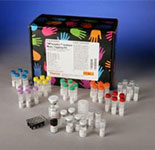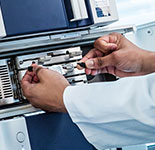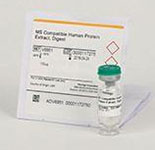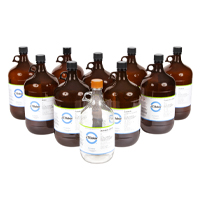Mass Spectrometry
Mass spectrometry is an important tool when specific compounds and materials must be identified with a high degree of precision. Among its uses are food quality and safety, drug testing, analyzing pesticide residue, protein identification, and carbon dating. Avantor offers a comprehensive range of products to meet your mass spectrometry needs.
Avantor equipment and products for mass spectrometry

Protein Reagents
Avantor offers a comprehensive line of protein reagents to use with protein assays to measure the total protein concentration of a sample compared to a standard. See what we have to offer.

Chromatography Columns
Chromatography columns are an essential tool from separating compounds and molecules from a sample mixture. Avantor carries several chromatography columns so you can find the one that’s best for your lab.

Proteins and Peptides
Avantor can provide your lab with a variety of kits, mixture solutions, and collagen matrices that you can use for a many essential laboratory functions.

Other Products
Avantor carries a wide range of equipment, products, and supplies commonly used in mass spectrometry. Take a look at everything we have to offer.
Mass spectrometry explained
Mass spectrometry is an important tool for identifying specific compounds or materials with a high degree of precision. This technique has many applications ranging from food quality and safety to carbon dating.
In the most basic terms, mass spectrometry is a sensitive technique used to detect, identify and quantitate molecules based on the molecule’s mass-to-charge (m/z) ratio.
How it works
All mass spectrometers have three primary components; an ion source, a mass analyzer, and an ion detector. Samples are prepared and loaded into the mass spectrometer in either liquid, gas, or dried form and are then vaporized and ionized by the ion source. There are variations of these components in each type of mass spectrometer, which offer a diverse range of options for testing different physical properties of samples and data collection.
Mass spectrometry applied
There are numerous applications for mass spectrometry, including both qualitative and quantitative uses. Mass spectrometry is most commonly used in analytical laboratories for the study of physical, chemical, or biological properties of compounds.
Additional applications of mass spectrometry:
- Identifying unknown compounds
- Determining the isotopic composition of elements in a molecule
- Determining the structure of a compound based on fragmentation
- Quantifying the amount of a compound in a sample
- Understanding the fundamentals of gas phase ion chemistry
This makes mass spectrometry an ideal tool in drug discovery, clinical testing, genomics, geology, and environmental studies on food and soil. Among the many applications in medicine and genomics, mass spectrometry can be used for the characterization of single nucleotide polymorphisms (SNPs), as well as in rapid toxic screenings for detecting toxins in blood.